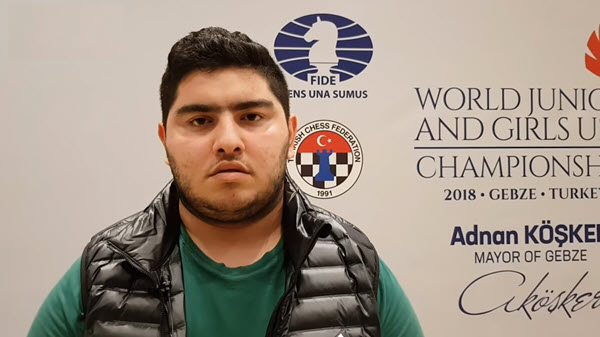Added on 9/17/2018

This week we will have a look at some of the action from the Champions Showdown in St. Louis, where ten top grandmasters tried their hand at an interesting chess variant. But before I give my two cents about all that, let’s wrap up the World Juniors with a remarkable result from the new champion.
GM Parham Maghsoodloo (Iran) Parham Maghsoodloo dominated the World Junior from start to finish. So impressive was the 17-year-old Iranian that even a loss in the last round to 16-year-old Russian Andrey Esipenko left him with a full point victory over the field. [Esipenko ended up just missing a medal on tiebreaks].
Let’s take a look at the last of Parham’s nine victories in this tournament where he overwhelms Russian Maksim Vavulin.
I’d like to have a bit of fun with a couple of short games from the event. In the first, Maghsoodloo’s countryman wins a straight up attacking game.
GM Mohammad Amin Tabatabaei (Iran)
Tabatabaei finished with 8 points. Finally, we have a very unusual tableau at the end of the next game:
That win propelled Lobanov to the bronze, while Indian Abimanyu Puranik took the silver. On the American side, Awonder Liang had a chance for a while, getting in range with 6.5/8. But after losing to the ultimate champion, Awonder completed queenside castling in the last two rounds (0-0-0) for a very disappointing result. Andrew Tang had a very sub-par result, but Akshita Gorti did quite respectably, with 7/11, good for 12th place. She might have hoped for higher, but after a 5.5/7 including a win over the top seed, she lost to Tokhirjonova of Uzbekistan and fell off the pace. The aforementioned Uzbek lost the title on tiebreaks to Maltsevskaya of Russia. Nino Khomeriki, who started with 6/6, had to settle for the bronze medal (8 points).
When I was a teenager circa 1980, I played some games in a chess variant where the players would take turns placing pieces on the back row. The game we called “prechess” morphed into Fischer Random or Chess960 with the tweak that both players would have identical starting positions but it would be out of their hands, positions chosen at random by a computer. Five 20-game matches had top grandmasters try their hand at Chess960 at the St. Louis Chess Club. Before we look at some of the chess that went down, I’d like to talk about what kind of place this weird new chess has for the present and future. For years we have heard the refrain that chess is played out, and the openings are too well developed. Perhaps the elite GMs, especially, enjoy a break from a steady parade of Berlin Defenses. Over time a type of opening theory can develop, but for now, the players must feel their way through the openings. It’s not just the rote moves that disappear, it’s the general understanding of typical positions and structures as well. It’s a challenge for the players to respond to the new dynamics of the game. They not only have to learn real rules like enhanced castling but rules of thumb about opening principles. You can see players approaching some of the games with a new kind of freedom. Let’s look at a game from the Vachier-Lagrave-Shankland match, which was dominated by the Frenchman, 17.5-8.5 (the values of the six rapid games were double that of the 14 blitz games). The US Champion found himself swamped by an attack that came on very suddenly
The lessened familiarity the players have with the new patterns of play leads to more mistakes and more decisive results, as they certainly did here. I suppose that is considered a good thing for the fans. But I have to say, as a fan, that it is difficult to make heads or tails out of the early segments of these games Commentary becomes further complicated. We still have the engines, but in most cases, their output is even harder to describe. Human analysts are going to have to figure out something about this game to say anything relevant until the game passes into the middlegame and endgame and takes on a normal appearance. Eventually, we can see glimpses of old-fashioned chess, as in this endgame from Aronian-Dominguez, won by the Armenian 17.5-8.5.
In other matches, So took care of Giri 15.5-10.5, Topalov slipped by the returning ex-champion Garry Kasparov 14.5-11.5, while Nakamura nipped Svidler 14-12. In the last two matches, superiority in the rapid portion made the difference. For those who think Chess960 is going to “save” chess, don’t get your hopes up. The games are drawn less often but kind of confusing and hard to follow. Moreover, it’s a different chess from what the spectators play, so they can’t learn much they can apply to their own games. It’s a curious oddity, but I think it will only go so far.
GM Joel Benjamin